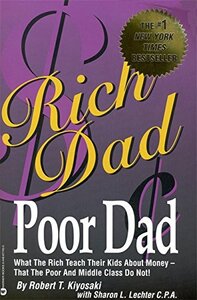Take a photo of a barcode or cover
2.05k reviews for:
Rich Dad, Poor Dad: What the Rich Teach Their Kids about Money – That the Poor and Middle Class Do Not!
Robert T. Kiyosaki
2.05k reviews for:
Rich Dad, Poor Dad: What the Rich Teach Their Kids about Money – That the Poor and Middle Class Do Not!
Robert T. Kiyosaki
Obviously you have to take this book with a grain of salt, as it is an older book that advises the reader to consider Donald Trump a (financial) hero. That being said, I think there is some sound advice in here, if you are open to it. The main theme of the book is against the main thinking of finances and assets, which can be controversial and scary to many people. It's also easy to get swept up in the success of the author.
The main take-away that I got from this book is that to be successful you need to become more educated in finances. While this book is not the end-all, be-all for financial success, it is a good springboard into beginning a new financial journey.
I would recommend this book to anyone that wants a general view and framework for assessing finances and thinking of new ways towards success.
The main take-away that I got from this book is that to be successful you need to become more educated in finances. While this book is not the end-all, be-all for financial success, it is a good springboard into beginning a new financial journey.
I would recommend this book to anyone that wants a general view and framework for assessing finances and thinking of new ways towards success.
It is a short book that I feel should be a required reading for every freshmen in high school.
3.3 Stars. I would write my own review, but my cousin Caue wrote something very similar to what I would've wrote, so here it is (only difference is that I give 3stars to his 4):
"This is a business book with a lot of cliches and more about mindset than actual strategies.
If you already have an entrepreneurial mindset it might not be for you...
I give it 4 stars because it is not for everybody. Robert Kiyosaki sounds very “sale-sy” and it can turn people off."
I did thoroughly enjoy a few chapters of this book (especially the chapters towards the end) though, that I can see myself coming back to periodically.
"This is a business book with a lot of cliches and more about mindset than actual strategies.
If you already have an entrepreneurial mindset it might not be for you...
I give it 4 stars because it is not for everybody. Robert Kiyosaki sounds very “sale-sy” and it can turn people off."
I did thoroughly enjoy a few chapters of this book (especially the chapters towards the end) though, that I can see myself coming back to periodically.
Interesting book. I think it does give some good thought on how better I should be investing my money and how to analyze my personal finance, although the context is very much American which makes it difficult to apply all the lessons in life. Other than that, it might be lacking in terms of some of the new ways of developing "assets", such as using the internet. Nevertheless, a good read. Lots to think about.
slow-paced
Quite slow and repetitive, for someone who has zero knowledge in Auditing and Investment theory, this could be an easy summary. However, it does not help further than the theory; conclusion invest when you have money to lose (in my opinion only individuals with money can afford to gamble it).
It is a book full of personal examples and opportunities, not a reality for everyone so take it as you can and adapt it to your reality?
It is a book full of personal examples and opportunities, not a reality for everyone so take it as you can and adapt it to your reality?
I forgot I read this years ago after my former spouse did and espoused the contents often. The book wasn't terribly dry. Basically I learned one must live below ones means to succeed. Drive your car for a decade or more, buy the smaller home, and don't upgrade when your wealth grows. I would add, marry someone of the same mindset. Growing up in poverty, this was not new information for me. I remain frugal and credit my upbringing for that.
Generally speaking, there was no substantial financial advice. It was an amusing read and sharing that he suggested joining/starting an MLM is a fun party story!
Read on a recommendation by a friend as part of a 2023 reading challenge.
My first one star review. I didn't strike this off from my TBR, because hey, you can always be wrong! Might as well read it just to see if I could get something out of it. And to some small extent I did.
To be fair, there are a few pieces of salient advice here and there. Investing in assets is good. Houses aren't investments. There's something to be said for some of Kiyosaki's words on mindset as well, and on working to learn (indeed, I think that while I'd not call him a visionary, this is one aspect where career centers did essentially pick up on that).
That being said, when the advice is bad, it's really bad, and that's what sinks this from a 2 or even a 3 to a 1. "Do a little insider trading, y'know, the 'legal' kind, as a treat" and the whole dismissal of ethical and legal corporate responsibility boils my blood as someone who's worked in compliance. As much as Kiyosaki says not to be arrogant, there's a sense of contempt where he can't understand those who would stay in "The Rat Race." Moreover, the book is frequently repetitive, inanely so. Repetition may boost learning, but this reads like a college freshman trying for a word count. In fact, several times Kiyosaki admits he isn't an especially good writer and that he views books as marketing opportunities, so I don't especially think he holds his readers in the highest esteem. To Kiyosaki, what people who don't want to speculate extensively are is chumps who serve as lessons in failure. That's a bleak way to view other human beings.
He also points out that one should strive to be an owner rather than an employee, which, the socialist part of me is tempted to say, why not both? He addresses systemic problems and then turns aside from them, acting as if merely everyone else was as rich as he was, we'd be living in a utopia. Some of his examples are downright laughable knowing what we know now. Even with the main trope of the book, the two dads, it appears that at least one dad is an amalgamation, and goodness, does it read like it. Such strained dialogue.
Basically, all the good advice (and there is some to be found here) you can get from this can be found somewhere else. Even the lien investment recommendation (which I'll have to look into) was picked up by Kiyosaki from another book.
If you want a look into Kiyosaki's principles and values, what makes him tick, this would be a fairly serviceable read. I might even give it a 3. But that's not what it claims to be, so it goes alllll the way down. Goodbye and good riddance.
My first one star review. I didn't strike this off from my TBR, because hey, you can always be wrong! Might as well read it just to see if I could get something out of it. And to some small extent I did.
To be fair, there are a few pieces of salient advice here and there. Investing in assets is good. Houses aren't investments. There's something to be said for some of Kiyosaki's words on mindset as well, and on working to learn (indeed, I think that while I'd not call him a visionary, this is one aspect where career centers did essentially pick up on that).
That being said, when the advice is bad, it's really bad, and that's what sinks this from a 2 or even a 3 to a 1. "Do a little insider trading, y'know, the 'legal' kind, as a treat" and the whole dismissal of ethical and legal corporate responsibility boils my blood as someone who's worked in compliance. As much as Kiyosaki says not to be arrogant, there's a sense of contempt where he can't understand those who would stay in "The Rat Race." Moreover, the book is frequently repetitive, inanely so. Repetition may boost learning, but this reads like a college freshman trying for a word count. In fact, several times Kiyosaki admits he isn't an especially good writer and that he views books as marketing opportunities, so I don't especially think he holds his readers in the highest esteem. To Kiyosaki, what people who don't want to speculate extensively are is chumps who serve as lessons in failure. That's a bleak way to view other human beings.
He also points out that one should strive to be an owner rather than an employee, which, the socialist part of me is tempted to say, why not both? He addresses systemic problems and then turns aside from them, acting as if merely everyone else was as rich as he was, we'd be living in a utopia. Some of his examples are downright laughable knowing what we know now. Even with the main trope of the book, the two dads, it appears that at least one dad is an amalgamation, and goodness, does it read like it. Such strained dialogue.
Basically, all the good advice (and there is some to be found here) you can get from this can be found somewhere else. Even the lien investment recommendation (which I'll have to look into) was picked up by Kiyosaki from another book.
If you want a look into Kiyosaki's principles and values, what makes him tick, this would be a fairly serviceable read. I might even give it a 3. But that's not what it claims to be, so it goes alllll the way down. Goodbye and good riddance.



